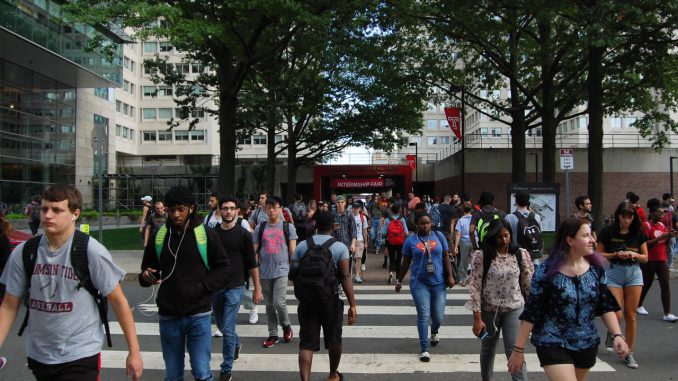
Dani Kalouche gets upset when she can’t eat during the day because of her classwork.
Kalouche, a junior computer science major, is taking 18 credits this semester. She said her workload leaves little free time in her schedule.
“I skip meals to do work because once I am doing homework I don’t want to stop for an hour and come back,” said Kalouche, who used to be a teaching assistant. “It’s better to just stay at the TECH Center or the library until I am finished grading students’ papers or completing my own assignments.”
Temple University students like Kalouche don’t have enough time to eat more than two meals every day because they prioritize finishing their classwork over eating. According to a 2016 systematic review by the Institute for Physical Activity and Nutrition, an Australian research institute at Deakin University committed to health, a perceived lack of time and meal skipping are a potential correlation.
“You gotta do what you gotta do to be successful in life,” Kalouche said.
Lori Lorditch, the nutritionist for Student Health Services, said skipping breakfast and lunch is common among Temple students.
“Most college students that I see end up with the most food and nutrient consumption in the evening and into the night, which really is not the healthiest habit,” she said.
Lorditch added students need more energy and nutrients at the beginning of their day.
According to a health guide for teenagers from the National Institute of Diabetes and Digestive and Kidney Diseases, teenagers need calcium, vitamin D, potassium, fiber, protein and iron in order to be healthy. NIDDK, a biomedical research institute, is a part of the National Institutes of Health.
According to NIDDK, those nutrients can be found in foods like cheese, oranges, tuna, bananas, beans, chicken, fish and more.
Jacqueline Hilton, a junior risk management major, spends Monday through Friday on campus finishing homework until around 10 p.m. When she studies for an exam, sometimes she doesn’t leave the TECH Center until 1 or 2 a.m.
Hilton said she usually waits to eat until her work is done.
“If my schedule was lighter, I would eat more during the day,” she said. “I would have more time to go get food instead of studying and putting in work for the week.”
Lorditch said she recommends eating at least four to six meals a day with no more than four hours in between each meal.
“The first thing that a student is going to notice from skipping meals is tiredness, fatigue and they might have trouble getting out of bed and going to class,” Lorditch said.
According to the National Institute of Diabetes and Digestive and Kidney Diseases’ guide, teenagers need to balance the energy used for daily activities by regaining it through the calories in certain food and drinks.
Savannah Nguyen, a junior accounting major, said she eats in the morning and late at night to make time for her rigorous course load.
“If my schedule was lighter I would feel more inclined to go get food because this semester I do not really have time to do anything besides focus on school,” Nguyen said.
According to the NIDDK’s guide, skipping meals can also lead to weight gain if more food is consumed later in the day to make up for a lack of eating.
Lorditch said for some individuals skipping meals can cause weight loss, especially if it’s over a period of time.
“But others can gain weight because they skip meals in the morning and [wait] until night, and then end up eating more at the end of the day when they are not as active,” she said.
Lori added that not getting an adequate amount of nutrients can also lead to depression and anxiety.
Lorditch said she suggests being prepared throughout the day and packing a lunch box filled with snacks like cheeses, granola bars and yogurts, to eat between meals.
“There’s a certain amount of nutrients the body needs each day, so it is important to get those nutrients from a variety of different foods,” Lorditch said. “When we are really [busy] and deficient in these nutrients, it can put the body at risk.”



Be the first to comment